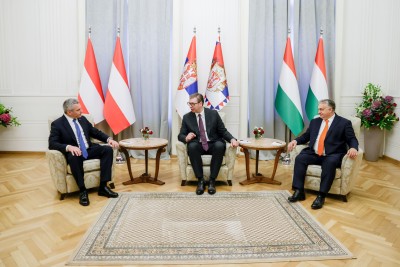Austria Strengthens Cooperation with Serbia and Hungary Against Illegal Migration
Austria, Hungary and Serbia once again consulted on the topic of migration. In the Serbian capital Belgrade, Austria's Chancellor Karl Nehammer met with Serbian Prime Minister Aleksandar Vucic and Hungarian Prime Minister Viktor Orban. As a result of Serbia's visa-free policy, Hungary and Austria are exerting pressure on it.
 Austria's Chancellor Karl Nehammer (l.) traveled to Belgrade for a working visit with Serbian President Aleksandar Vucic (m.) and Hungarian Prime Minister Viktor Orban (r.). / Picture: © Bundeskanzleramt (BKA) / Hans Hofer
Austria's Chancellor Karl Nehammer (l.) traveled to Belgrade for a working visit with Serbian President Aleksandar Vucic (m.) and Hungarian Prime Minister Viktor Orban (r.). / Picture: © Bundeskanzleramt (BKA) / Hans Hofer
It is common knowledge that the conservative governments of Austria and Hungary are taking a hard line against migration. Serbia is being pressured by Hungary and Austria because of its visa-free regime. The migration summit aimed to form a strong axis in the fight against illegal migration and to jointly set measures for strong border protection.
For Nehammer, the European asylum system has "failed. It could not be that economic migration and flight were mixed, that many made their way to Europe without a chance for asylum. "We will therefore support Serbia in carrying out repatriations directly from Serbia to the countries of origin - even before the gates of the EU," the chancellor said in advance.
"Asylum tourism must be stopped," emphasized Federal Chancellor Karl Nehammer in Belgrade during a meeting with Hungary's Prime Minister Viktor Orbán and Serbian President Aleksandar Vučić. In the course of this, a "Memorandum of Understanding" was signed to strengthen cooperation between the 3 countries. "We are concerned with the fight against illegal migration, terrorism and organized crime. There is a need for a clear distinction between asylum and migration. People who come for economic reasons must be treated differently from those seeking protection. Help on the ground makes more sense and is cheaper than elaborate asylum procedures," held the Austrian head of government, whose thanks were directed at the Serbian president, as asylum tourism from India, Tunisia and other states had been curbed by a decision to abolish visa-free entry and close the air bridge.
"With deportations at the gates of the EU, we want to send a signal to the countries of origin. Therefore, a return plan for migrants is planned with Serbia, for example in the form of training for repatriation specialists and through information campaigns on voluntary return. We also want to provide support by deploying 100 officers and technical equipment at the Serbian-Northern Macedonian border," said Nehammer, who also referred to the joint task force set up by the 3 states to combat smuggling and the police support of 70 officers in Hungary.
Austria is among the most burdened countries, he added: "By the end of the year, we expect more than 100,000 applications. There must be no bans on a discussion about the EU reception directives because that puts chains on the state," the chancellor explained.
"Through our joint initiative, we want to send a strong signal to Brussels. We continue to advocate Serbia's early accession to the EU," Karl Nehammer concluded. The next meeting in this form is planned for the end of the year in Vienna.



